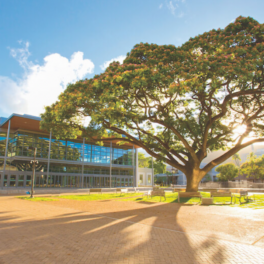Marine biology course focuses on place-based research methods in Hawai‘i
 From the wall of Heʻeia Fishpond, MBGP students learn about the history of the Heʻeia ahupuaʻa from Fred Reppun (HeNERR). Credit: UH Marine Biology Graduate Program.
From the wall of Heʻeia Fishpond, MBGP students learn about the history of the Heʻeia ahupuaʻa from Fred Reppun (HeNERR). Credit: UH Marine Biology Graduate Program.A new course, Kūlana Noiʻi: Introduction to Place-based Research Methodologies in Hawaiʻi, was piloted this summer as part of the Marine Biology Graduate Program (MBGP) at the University of Hawai‘i (UH) at Mānoa.
The intensive three-week course is aimed at providing students with a grounding in what constitutes a research paradigm and the knowledge and skills necessary to conduct place-based research in Indigenous spaces with a focus on Hawaiʻi.
“This is the first component of a new curriculum for our program,” said Megan Donahue, research professor at the Hawai‘i Institute of Marine Biology (HIMB) and co-director of the MBGP. “It was a foundational experience for our incoming students. The course creates opportunities for the students to understand their own role in Hawai‘i, their kuleana here, and how their research can serve the interwoven coastal communities—of people, water, and marine organisms—here in Hawai‘i.”
Through readings and lectures from experts students were exposed to multiple disciplines and knowledge frameworks for approaching scientific inquiry. The course used the Kūlana Noiʻi publication as an ethical framework to explore reciprocal, place-based research methodologies. Importantly, the course outlines the complex factors including history, culture, ecology and governance that inform research and stewardship of marine resources across Hawaiʻi.
Students also gained first-hand experience in building connections with local community organizations that implement Indigenous management practices. They worked alongside place-based stewards, researchers, and cultural practitioners to learn about conservation issues and practices in Hawaiʻi. These laulima activities demonstrated how place-based stewardship initiatives on Oʻahu perpetuate ecosystems of the Hawaiian archipelago.
“This was an amazing course that opened my eyes to many issues surrounding Hawaiʻi … I think it definitely adds value to my learning experience and made me more excited to see what the rest of my career as a researcher has to offer,” said an incoming student in the course evaluation.
The team of instructors for the recent course represents both the UH Mānoa School of Ocean and Earth Science and Technology (SOEST) and the College of Natural Sciences (CNS), including the Department of Oceanography, School of Life Sciences, HIMB, Hawai‘i Sea Grant Center of Excellence for Integrated Knowledge Systems, and He‘eia National Estuarine Research Reserve.
Associate professor of Oceanography and Sea Grant Rosie Alegado, who co-developed the Kūlana Noiʻi and served as the lead instructor noted that, “This course aligns the need to incorporate Native Hawaiian place of learning more explicitly in the Marine Biology curriculum and is responsive to the concrete needs of students conducting research in Pacific Island communities.”
In addition to place-based activities and panels, a series of self-directed learning broadened students’ skill sets and critical thinking as well as provided space for self-reflection towards integrating place-based dimensions in their graduate research. The course culminated with students developing a set of individual place-based research ethics, or their personal Kūlana Noiʻi, to inform their graduate work.
“Even if long overdue, some things are worth the wait. This transformational experience will set our marine biologists on new and exciting paths that meet our communities needs” added Celia Smith, professor in the School of LIfe Sciences and co-director of the Marine Biology Graduate Program.
Development of Kūlana Noi‘i
The Kūlana Noi‘i outlines a set of ideas, values, and behaviors that when applied alongside hard work can build more just and generative relationships between researchers and community. The name Kūlana Noiʻi was chosen with careful intention to describe how an individual carries themselves as they seek knowledge or information. (Meanings of kūlana include “station, rank, title, condition, position, place, quality, grade, rating, reputation, stance, attitude, poise, carriage, posture, situation, patch, site; outstanding, prominent” and meanings of noiʻi include “To seek knowledge or information; to investigate; investigation, examination, research, searching for even the smallest detail”).
Place-based stewards in the Heʻeia ahupuaʻa expressed a need for a set of guidelines to help ensure that research projects focused in Heʻeia engage in equitable and reciprocal partnership with those connected to and caring for the ahupuaʻa. In response to this need, a partnership was formed between the University of Hawai‘i Sea Grant College Program, Kuaʻāina Ulu ʻAuamo (KUA), and others to develop the Kūlana Noi‘i.
More about the Marine Biology Graduate Program
The Marine Biology Graduate Program is co-administered by SOEST and CNS, benefitting from cross-campus synergy. In 2020, the program was elevated from provisional to established status, and this year marks the tenth cohort of incoming students.


